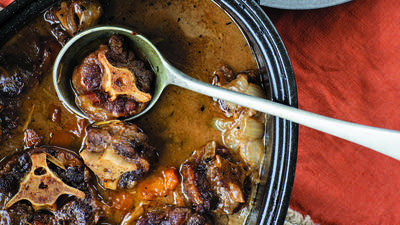
When Céline Bénitah cooks this dish, she blanches the olives for a minute to get rid of the bitterness, a step that I never bother with. If you keep the pits in, just warn your guests in order to avoid any broken teeth! Céline also uses the marvelous Moroccan spice mixture ras el hanout, which includes, among thirty other spices, cinnamon, cumin, cardamom, cloves, and paprika. You can find it at Middle Eastern markets or through the Internet, or you can use equal amounts of the above spices or others that you like.
To make my life easier, I assemble the spice rub the day before and marinate the chicken overnight. The next day, before my guests arrive, I fry the chicken and simmer it.
Ingredients
4 large garlic cloves, mashed
Salt and freshly ground pepper to taste
1 teaspoon ground tumeric
1 to 2 tablespoons ras el hanout
1 bunch of fresh cilantro, chopped
4 tablespoons olive oil
One 3 1/2-to-4-pound chicken, cut into 8 pieces
1 teaspoon cornstarch
1 cup black Moroccan dry-cured olives, pitted
Diced rind of 2 preserved lemons (see below)
Instructions
Mix the mashed garlic with salt and freshly ground pepper to taste, the tumeric, the ras el hanout, half the cilantro, and 2 tablespoons of the olive oil. Rub the surface of the chicken pieces with this spice mixture, put them in a dish, and marinate in the refrigerator, covered, overnight.
The next day, heat the remaining 2 tablespoons olive oil in a large pan. Sauté the spice-rubbed chicken until golden brown on each side.
Stir the cornstarch into 1 cup water, and pour over the chicken. Bring to a boil, and simmer, covered, for about 20 minutes. Add the olives, and continue cooking for another 20 minutes. Sprinkle on the preserved lemon, and continue cooking for another 5 minutes. Garnish with the remaining cilantro. Serve with rice or couscous.
Citrons Confits (Preserved Lemons)
Yield: 8 preserved lemons
Preserved lemons are an indispensable item in my pantry cupboard. I use them all the time and believe they are best made at home. Although I have tasted lemons preserved in water or an equal mix of lemon juice and water, I much prefer them preserved in pure lemon juice. Many people scrape out and discard the pulp when using the lemons, but I often include the preserved pulp. I blend a preserved lemon with my hummus, sprinkle the rind on grilled fish, and stuff my chicken with a whole lemon, and I dice preserved lemons and mix them into salads, rice dishes, and vegetables. In addition to regular lemons, you can also use Meyer lemons or, as Irene Weil does, even kumquats.
Ingredients
8 lemons (about 1 1/2 pounds)
About 1/2 cup kosher salt
1 cup fresh lemon juice, plus more if necessary
2 tablespoons olive oil
Instructions
Cut off the very ends of each lemon. Cut each one lengthwise into quarters, cutting to but not through the opposite end. Sprinkle 2 tablespoons of salt into the cut sides of each lemon.
Put the lemons in a large jar (it's fine if you have to squeeze them in, because they will shrink), and cover completely with lemon juice. Let sit for a day.
The next day, if they are not covered with lemon juice, pour a thin film of olive oil over the lemons. This will help keep them sealed while they preserve. Put the jar in the refrigerator and allow to cure for 2 to 3 weeks. Before using, scrape off the pulp if desired.
Note: You can shorten the curing period by about 2 weeks by freezing the lemons for a few days after cutting them. Defrost and cure as above in salt and lemon.
Quiches, Kugels, and Couscous: My Search for Jewish Cooking in France by Joan Nathan, Knopf 2010.
Before you go...
Each week, The Splendid Table brings you stories that expand your world view, inspire you to try something new and show how food brings us together. We rely on you to do this. And, when you donate, you'll become a member of The Splendid Table Co-op. It's a community of like-minded individuals who love good food, good conversation and kitchen companionship. Splendid Table Co-op members will get exclusive content each month and have special opportunities for connecting with The Splendid Table team.
Donate today for as little as $5.00 a month. Your gift only takes a few minutes and has a lasting impact on The Splendid Table and you'll be welcomed into The Splendid Table Co-op.



